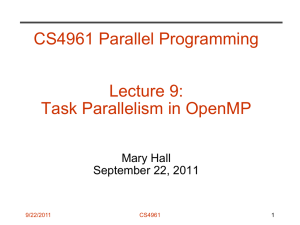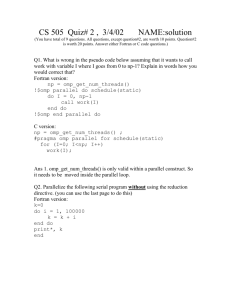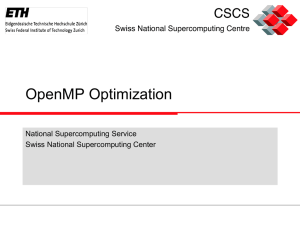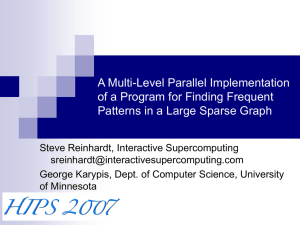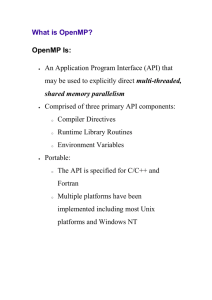Parallel Programs
advertisement
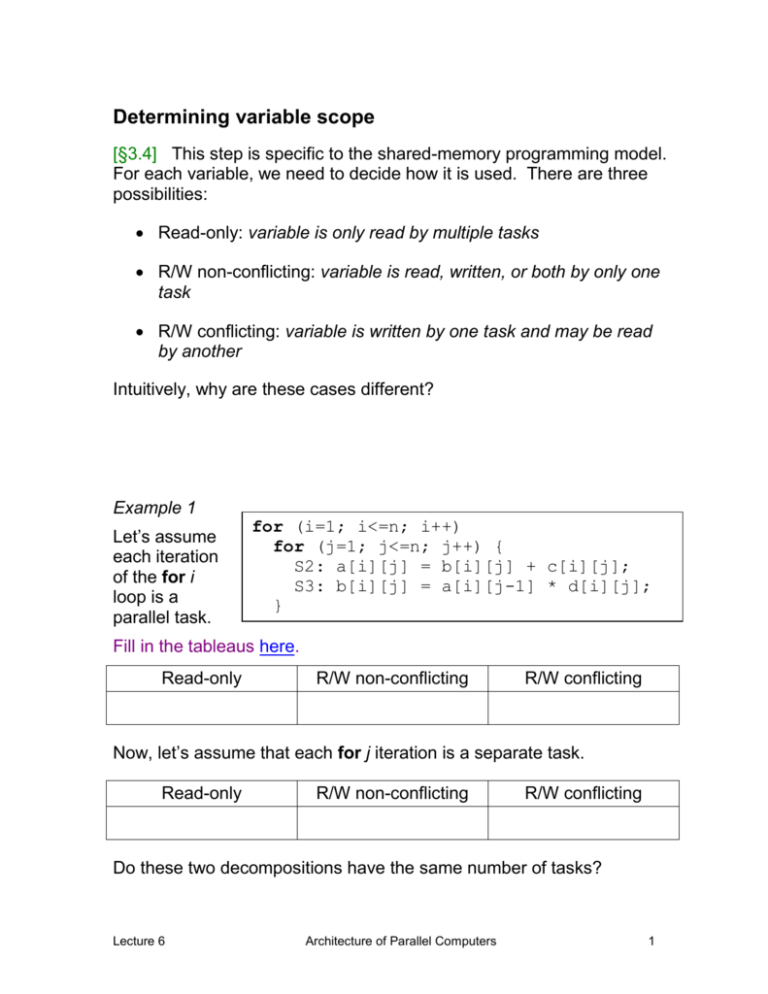
Determining variable scope
[§3.4] This step is specific to the shared-memory programming model.
For each variable, we need to decide how it is used. There are three
possibilities:
Read-only: variable is only read by multiple tasks
R/W non-conflicting: variable is read, written, or both by only one
task
R/W conflicting: variable is written by one task and may be read
by another
Intuitively, why are these cases different?
Example 1
Let’s assume
each iteration
of the for i
loop is a
parallel task.
for (i=1; i<=n; i++)
for (j=1; j<=n; j++) {
S2: a[i][j] = b[i][j] + c[i][j];
S3: b[i][j] = a[i][j-1] * d[i][j];
}
Fill in the tableaus here.
Read-only
R/W non-conflicting
R/W conflicting
Now, let’s assume that each for j iteration is a separate task.
Read-only
R/W non-conflicting
R/W conflicting
Do these two decompositions have the same number of tasks?
Lecture 6
Architecture of Parallel Computers
1
Example 2
Let’s assume that
each for j iteration is
a separate task.
Read-only
for (i=1; i<=n; i++)
for (j=1; j<=n; j++) {
S1: a[i][j] = b[i][j] + c[i][j];
S2: b[i][j] = a[i-1][j] * d[i][j];
S3: e[i][j] = a[i][j];
}
R/W non-conflicting
R/W conflicting
Exercise: Suppose each for i iteration were a separate task …
Read-only
R/W non-conflicting
R/W conflicting
Privatization
Privatization means making private copies of a shared variable.
What is the advantage of privatization?
Of the three kinds of variables in the table above, which kind(s) does it
make sense to privatize?
Under what conditions is a variable privatizable?
When a variable is privatized, one private copy is made for each thread
(not each task).
© 2010 Edward F. Gehringer
CSC/ECE 506 Lecture Notes, Spring 2010
2
Result of privatization: R/W conflicting R/W non-conflicting
Let’s revisit the examples.
Example 1
Of the R/W conflicting variables, which
are privatizable?
for (i=1; i<=n; i++)
for (j=1; j<=n; j++) {
S2: a[i][j] = b[i][j] + c[i][j];
S3: b[i][j] = a[i][j-1] * d[i][j];
}
Which case does each such variable fall into? i is case 2 (value known
ahead of time); j is case 1 (always written by task before task reads it).
We can think of privatized variables as arrays, indexed by process ID:
Example 2
Parallel tasks: each for j loop iteration.
Is the R/W conflicting variable j privatizable? If so, which case does it
represent?
Reduction
Reduction is another way to remove conflicts. It is based on partial
sums.
Suppose we have a large matrix, and need to
perform some operation on all of the elements—
let’s say, a sum of products—to produce a single
result.
We could have a single processor undertake this,
but this is slow and does not make good use of the
parallel machine.
So, we divide the matrix into portions, and have one processor work on
each portion.
Lecture 6
Architecture of Parallel Computers
3
Then after the partial sums are complete, they are combined into a
global sum. Thus, the array has been “reduced” to a single element.
Examples:
addition (+), multiplication (*)
Logical (and, or, …)
The reduction variable is the scalar variable that is the result of a
reduction operation.
Criteria for reducibility:
Reduction variable is updated by each task, and the order of
update
Hence, the reduction operation must be
Goal: Compute
y = y_init op x1 op x2 op x3 … op xn
op is a reduction operator if it is commutative
u op v = v op u
and associative
(u op v) op w = u op (v op w)
Certain operations can be transformed into reduction operations (see
homework).
© 2010 Edward F. Gehringer
CSC/ECE 506 Lecture Notes, Spring 2010
4
Summary of scope criteria
Should be
Should be
declared private declared shared
Example 1
with for i parallel
tasks
Fill in the answers
here.
Read-only
for (i=1; i<=n; i++)
for (j=1; j<=n; j++) {
S2: a[i][j] = b[i][j] + c[i][j];
S3: b[i][j] = a[i][j-1] * d[i][j];
}
R/W non-conflicting
Declare as shared
Example 2
with for j parallel tasks
Fill in the answers here.
Read-only
R/W conflicting
Declare as private
for (i=1; i<=n; i++)
for (j=1; j<=n; j++) {
S1: a[i][j] = b[i][j] + c[i][j];
S2: b[i][j] = a[i-1][j] * d[i][j];
S3: e[i][j] = a[i][j];
}
R/W non-conflicting
Declare as shared
Lecture 6
Should be de- Non-privatizable
clared reduction R/W conflicting
R/W conflicting
Declare as private
Architecture of Parallel Computers
5
Example 3
Consider matrix
multiplication.
for (i=0; i<n; i++)
for (j=0; j<n; j++) {
C[i][j] = 0.0;
for (k=0; k<n; k++) {
C[i][j] = C[i][j] + A[i][k]*B[k][j];
}
}
}
Exercise:
Suppose the
parallel tasks are for k iterations. Determine which variables are
conflicting, which should be declared as private, and which need to be
protected against concurrent access by using a critical section.
Read-only
R/W non-conflicting
Declare as shared
R/W conflicting
Declare as private
Which variables, if any, need to be protected by a critical section?
Now, suppose the parallel tasks are for i iterations. Determine which
variables are conflicting, which should be declared as private, and
which need to be protected against concurrent access by using a
critical section.
Read-only
R/W non-conflicting
Declare as shared
R/W conflicting
Declare as private
Which variables, if any, need to be protected by a critical section?
© 2010 Edward F. Gehringer
CSC/ECE 506 Lecture Notes, Spring 2010
6
Synchronization
Synchronization is how programmers control the sequence of
operations that are performed by parallel threads.
Three types of synchronization are in widespread use.
Point-to-point:
o a pair of post() and wait()
o a pair of send() and recv() in message passing
Lock
o a pair of lock() and unlock()
o only one thread is allowed to be in a locked region at a
given time
o ensures mutual exclusion
o used, for example, to serialize accesses to R/W concurrent
variables.
Barrier
o a point past which a thread is allowed to proceed only when
all threads have reached that point.
Lock
What problem may arise here?
// inside a parallel region
for (i=start_iter; i<end_iter; i++)
sum = sum + a[i];
A lock prevents more than one thread from being inside the locked
region.
Lecture 6
Architecture of Parallel Computers
7
// inside a parallel region
for (i=start_iter; i<end_iter; i++) {
lock(x);
sum = sum + a[i];
unlock(x);
}
Issues:
What granularity to lock?
How to build a lock that is correct and fast.
Barrier: Global event synchronization
A barrier is used when the code that follows requires that all threads
have gotten to this point. Example: Simulation that works in terms of
timesteps.
Load balance is important.
Execution time is dependent on the slowest thread.
This is one reason for gang scheduling and avoiding time sharing and
context switching.
© 2010 Edward F. Gehringer
CSC/ECE 506 Lecture Notes, Spring 2010
8
Intro to OpenMP: directives format
Refer to http://www.openmp.org and the OpenMP 2.0 specifications in
the course web site for more details
#pragma omp directive-name [clause[ [,] clause]...] new-line
For example,
#pragma omp for [clause[[,] clause] ... ] new-line
for-loop
The clause is one of
private(variable-list)
firstprivate(variable-list)
lastprivate(variable-list)
reduction(operator: variable-list)
ordered
schedule(kind[, chunk_size])
nowait
Parallel for loop
#include <omp.h>
//…
#pragma omp parallel
{
…
#pragma omp parallel for default(shared) private(i)
for (i=0; i<n; i++)
A[I]= A[I]*A[I]- 3.0;
}
Parallel sections
#pragma omp parallel shared(A,B)private(i)
{
#pragma omp sections nowait
{
#pragma omp section
for(i=0; i<n; i++)
A[i]= A[i]*A[i]- 4.0;
Lecture 6
Architecture of Parallel Computers
9
#pragma omp section
for(i=0; i<n; i++)
B[i]= B[i]*B[i] + 9.0;
} // end omp sections
} // end omp parallel
Type of variables
shared, private, reduction, firstprivate, lastprivate
Semi-private data for parallel loops:
reduction: variable that is the target of a reduction operation
performed by the loop, e.g., sum
firstprivate: initialize the private copy from the value of the shared
variable prior to parallel section
lastprivate: upon loop exit, master thread holds the value seen by
the thread assigned the last loop iteration (for parallel loops only)
Barriers
Barriers are implicit after each parallel section
When barriers are not needed for correctness, use nowait clause
#include <omp.h>
//…
#pragma omp parallel
{
…
#pragma omp for nowait default(shared) private(i)
for(i=0; i<n; i++)
A[I]= A[I]*A[I]- 3.0;
}
© 2010 Edward F. Gehringer
CSC/ECE 506 Lecture Notes, Spring 2010
10
